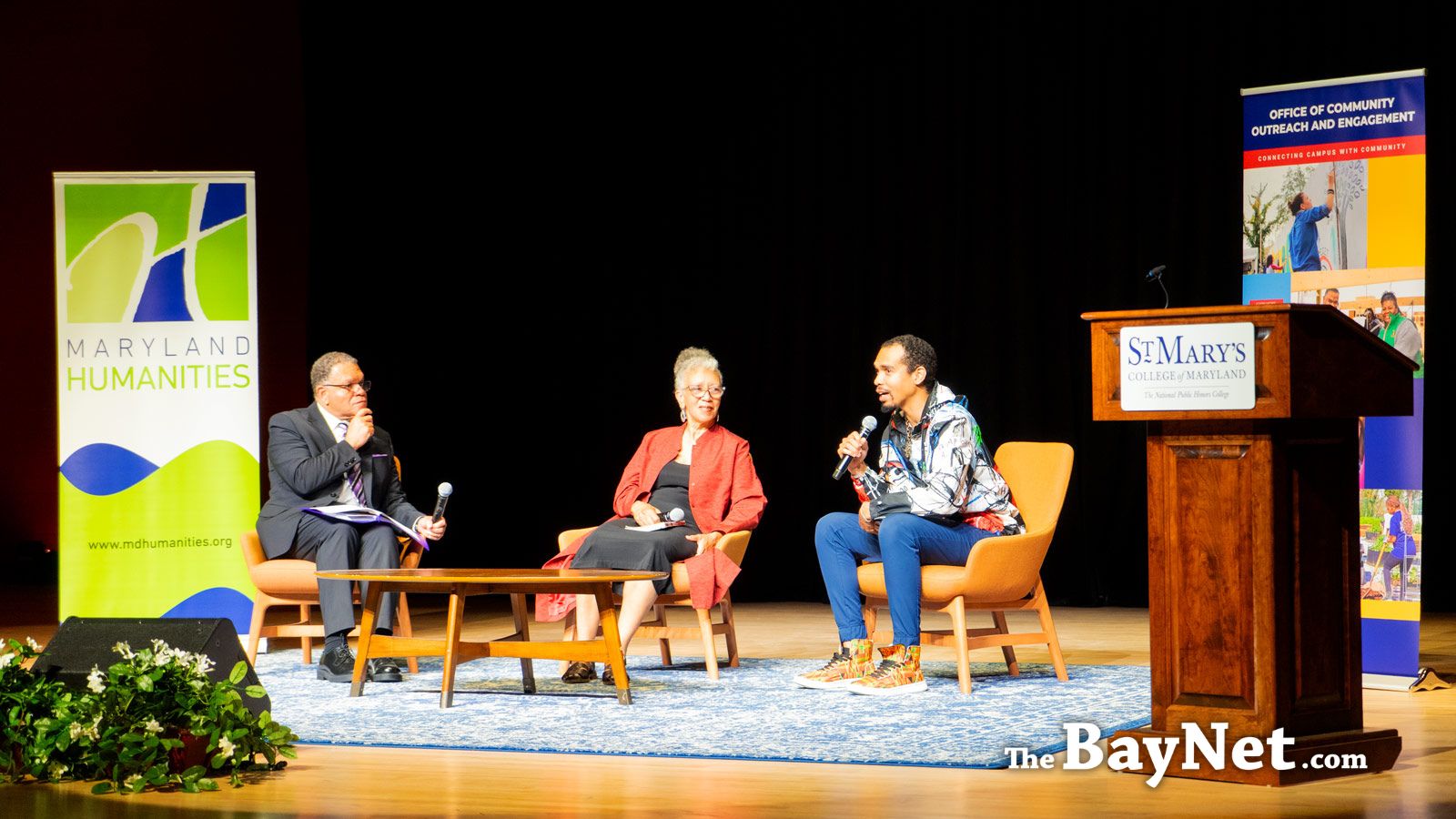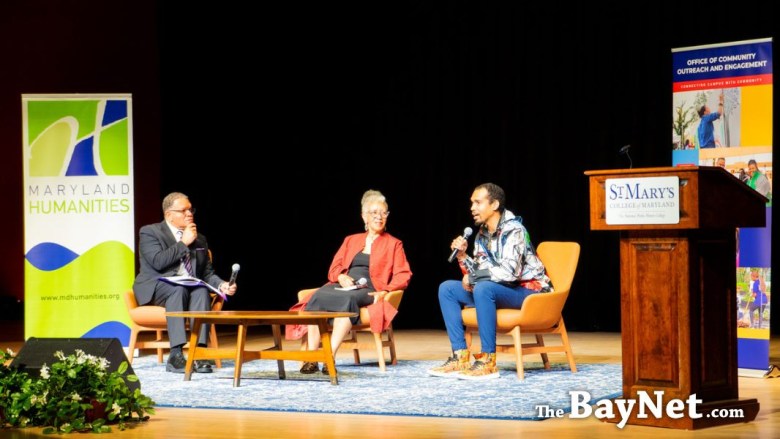 Image: Left: Jeff Coleman, Carole Boston Weatherford, Jeffery Boston Weatherford at St. Mary’s College of Maryland
Image: Left: Jeff Coleman, Carole Boston Weatherford, Jeffery Boston Weatherford at St. Mary’s College of Maryland
ST. MARY’S CITY, Md. — Kin: Rooted in Hope was selected by Maryland Humanities as 2025’s One Maryland One Book. It was written by Carole Boston Weatherford and features art by her son, Jeffery Boston Weatherford. The book uses poetry and illustrations to follow Weatherford’s ancestral bondage at the Wye House plantation in Talbot County, Maryland, tracing their lives from enslavement through the Civil War and Reconstruction.
The One Maryland One Book program held a season-closing author presentation event on Oct. 8 at St. Mary’s College of Maryland. Maryland Humanities Program Officer Aditya Desai explained that the reading initiative aimed to create spaces for learning and connection. The program included more than 150 events each year, ranging from readings and lectures to film screenings, music and dance performances, and walking tours.
This year’s theme was, “What We Collect, What We Tell,” and it asked communities in Maryland to consider how history is preserved and passed down. It invited reflection on how family heirlooms, letters and storytelling help communities understand who they are and where they come from.
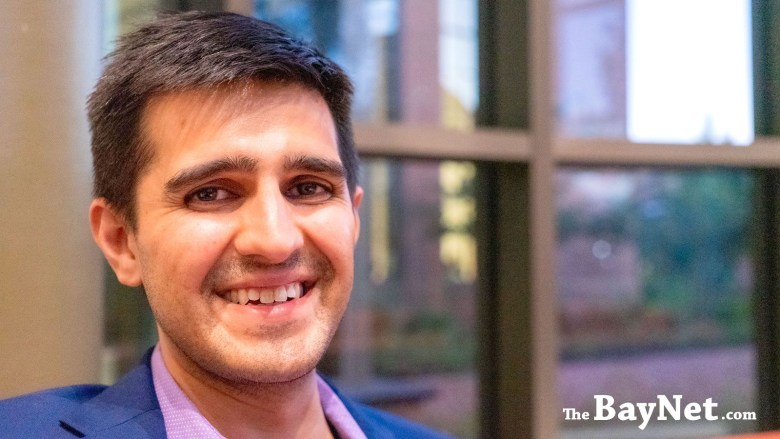 Image: Aditya Desai, Maryland Humanities Program Officer
Image: Aditya Desai, Maryland Humanities Program Officer
“Whether your life is similar to Carole’s or very different, the act of what she did — going into her family’s past, seeing what research she could find, collecting the scraps, and then creating a work of art as a way of telling that story — is a very powerful thing,” Desai said. “It preserves a story but also gives you a sense of control and agency.”
The One Maryland One Book Southern Maryland partners included St. Mary’s County Library, Calvert Library, Charles County Public Library, the College of Southern Maryland, St. Mary’s College of Maryland and St. Mary’s County Museums. Desai said the Southern Maryland Regional Library Association and the Southern Maryland Heritage Area also provided critical support.
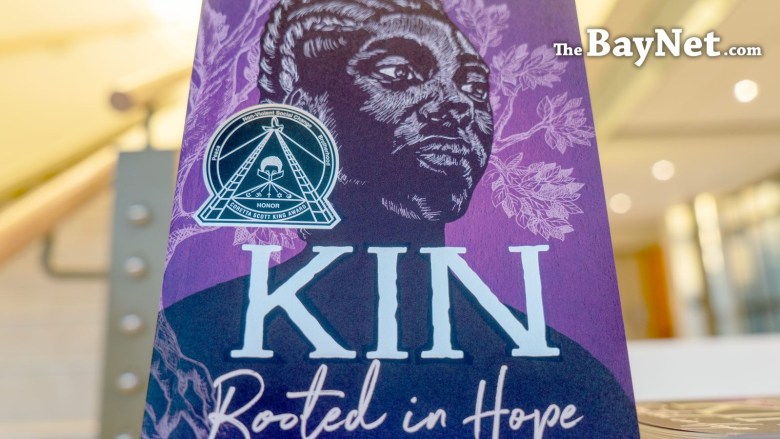 Image: Kin: Rooted in Hope
Image: Kin: Rooted in Hope
Maryland History Preserved Beyond Words
According to Carole Boston Weatherford, Kin: Rooted in Hope restored voice and dignity to people whose names appear only in ledgers and archives. Records, history and artifacts she found one by one pieced together her lineage on Maryland’s Eastern Shore. She said that some of the people she identified may not have been directly related but were either living in bondage with her late ancestor Isaac Copper, living at Wye House or part of a neighboring plantation.
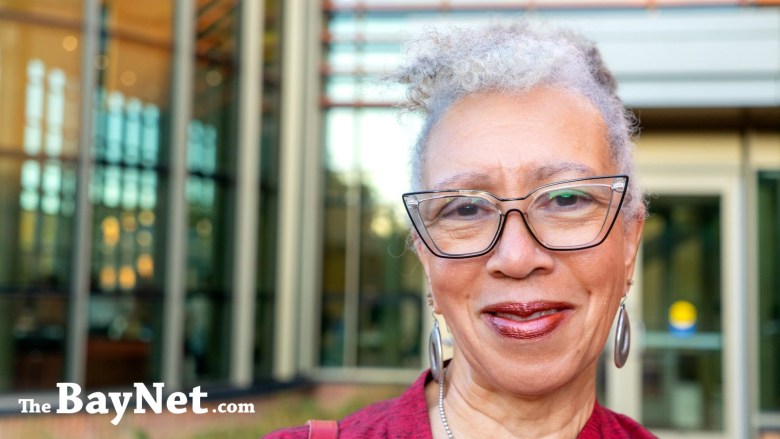 Image: Carole Boston Weatherford
Image: Carole Boston Weatherford
“I originally sought out to just tell stories about my family members at this plantation, but at Wye House alone, there was a community of about 300 enslaved people, and that community was called Long Green,” Weatherford said. “So, I couldn’t really do justice to the story by focusing just on my own family.”
Weatherford learned that her ancestors co-founded the villages of Unionville and Copperville in Talbot County. Her research also tracked the activity of three major slave-owning families in Maryland along the Eastern Shore.
Isaac Copper, Weatherford’s earliest known ancestor, was documented in Kin: Rooted in Hope. According to Weatherford, he was a longtime slave living at Wye House who was like a foreman for the house labor. When he was older, he mainly worked as a doctor and a priest, and that inspired the poem “The Doctor’s Cures.” Uncovering Isaac Copper’s history gave Weatherford a foundation for her research because his presence was documented for so many years — often his name was first on inventory lists, there were photographs, and prominent people wrote about him.
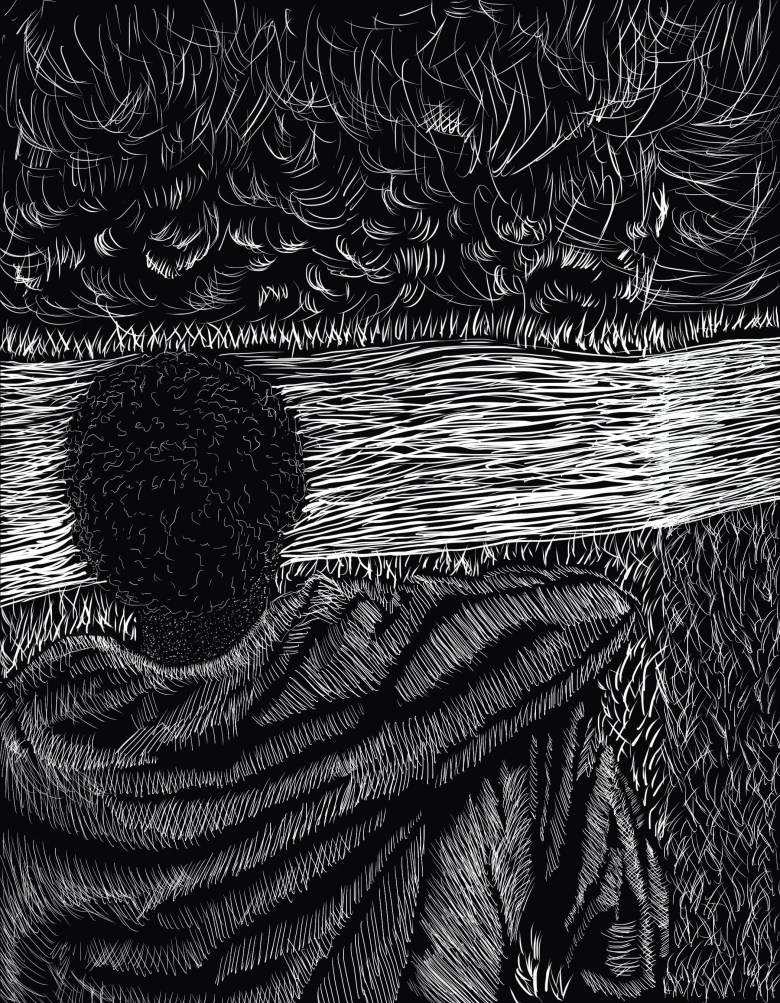 Image: Young Isaac, by Jeffery Boston Weatherford
Image: Young Isaac, by Jeffery Boston Weatherford
“Frederick Douglass encountered him as an old man,” Weatherford said. “At that point, Isaac Copper was no longer working as a house servant; he was a doctor or minister.”
By referencing Frederick Douglass’s documented interactions with Isaac Copper, Weatherford situated her family history within the same historical landscape as a significant Maryland abolitionist. Reaching beyond one family, Kin: Rooted in Hope reflected the collective experience of African Americans who lived and labored on Maryland’s Eastern Shore.
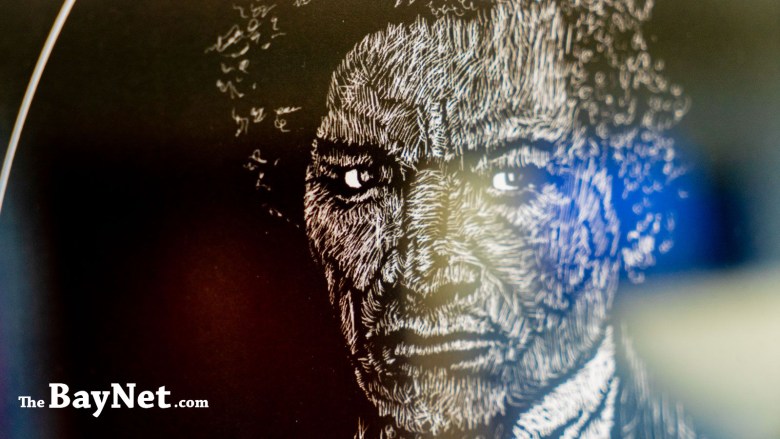 Image: Frederick Douglass, Framed Scratchboard Art Display
Image: Frederick Douglass, Framed Scratchboard Art Display
Award-winning illustrator Jeffery Boston Weatherford illustrated three books, including Kin: Rooted in Hope, using a technique called “scratchboard.” Weatherford said he was drawing with the light, as scratchboard involves using a dark overlay and scratching it to reveal the lighter color beneath. He said that he pulled people out of the darkness of history and preserved their story.
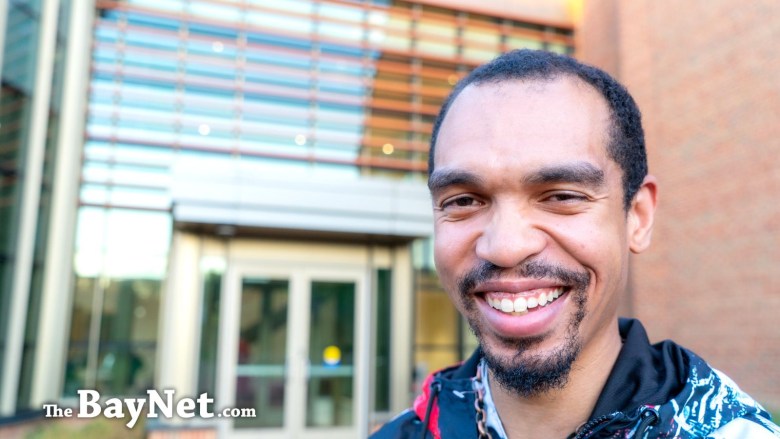 Image: Jeffery Boston Weatherford
Image: Jeffery Boston Weatherford
“I’m drawing and creating these images of our ancestors, of people who most likely never had any type of story written about them, bringing them out of the previous darkness of history,” Weatherford said. “Lost to our memories, lost to everything, and then bringing them back into light — quite literally drawing with the light.”
Weatherford said he began his work on Kin: Rooted in Hope by reading his mother’s poetry, meditating and letting images come naturally. Once he could see a poem in his mind, he found models who matched what he envisioned. He used himself, his wife, his mother and his niece as subjects in the artwork. For the illustration accompanying the poem “The Doctor’s Cures,” he posed himself with a mortar and pestle.
Weatherford is a spoken word poet and MC, known internationally from the United States to the Middle East and West Africa for collaborations and educational initiatives. He has been recognized by the Association for Library Service to Children and the National Council for the Social Studies for his contributions to literacy and creativity.
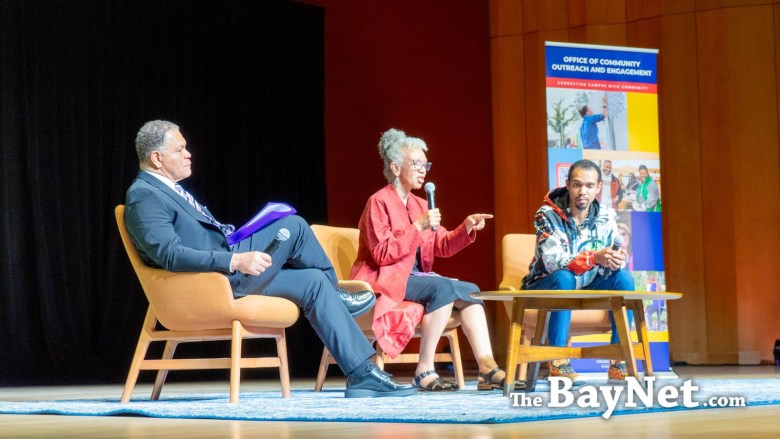 Image: Carole Boston Weatherford Engaging with Community, St. Mary’s College of Maryland
Image: Carole Boston Weatherford Engaging with Community, St. Mary’s College of Maryland
Discussions Close One Maryland One Book Tour in St. Mary’s City
The final presentation for the One Maryland One Book brought the statewide conversation full circle. Readers who followed the program through local libraries and colleges gathered to hear the Weatherfords discuss how poetry and art reclaimed erased voices and honored the people who lived on Maryland’s Eastern Shore long before their names appeared in history books.
According to Jeff Coleman, chair of the English Department at St. Mary’s College of Maryland, through Kin: Rooted in Hope, the Weatherfords reminded readers that understanding history begins with listening to the stories that have been passed down — and that the communities of Southern Maryland remain part of that larger story.
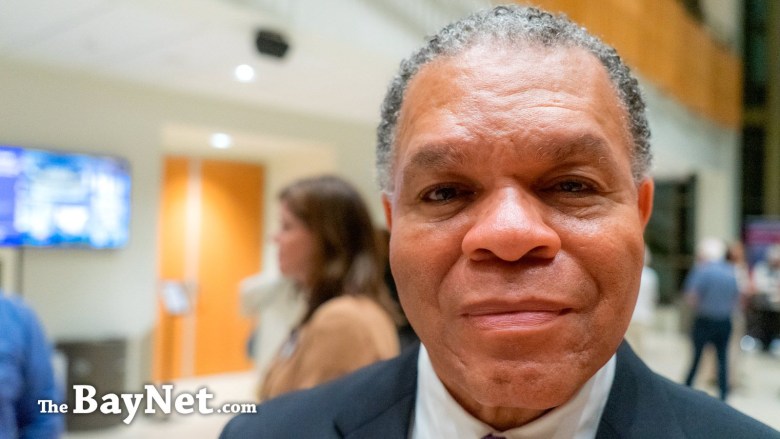 Image: Jeff Coleman, St. Mary’s College of Maryland, Chair of the English Department
Image: Jeff Coleman, St. Mary’s College of Maryland, Chair of the English Department
“We’re honored that we were one of the sites for the One Maryland One Book this year,” Coleman said. “What we want people to take away from this opportunity is the rich cultural history that is in Maryland. That history is not only pertinent, exciting and relevant to Marylanders, but it spins throughout the whole country.”
During the discussion, community members asked about Kin: Rooted in Hope, the meaning of family history and how art and writing could preserve stories that risk being forgotten. Carole Boston Weatherford said that years of genealogical study and historical research informed the book. She emphasized that Kin grew out of both archival investigation and imagination.
Jeffery Boston Weatherford discussed his artistic process and how illustrating the book deepened his connection to Maryland.
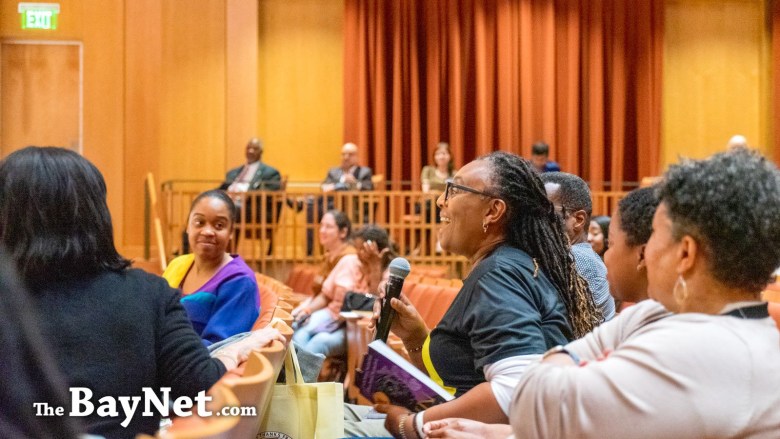 Image: Kin: Rooted in Hope Audience Discussion, St. Mary’s College of Maryland
Image: Kin: Rooted in Hope Audience Discussion, St. Mary’s College of Maryland
Audience members also shared how the book encouraged them to explore their own family histories and connections with the past in Southern Maryland. Some expressed that hearing the Weatherfords speak made Maryland’s early history feel more immediate and personal.
The discussion reflected the goals of the One Maryland One Book program by creating dialogue that linked literature, history and community. The Weatherfords signed books, spoke candidly with people and thanked readers for engaging with their work and for welcoming their family’s story into the wider narratives of Maryland.
The presentation in St. Mary’s City ended the statewide tour on a thoughtful note. Through poetry, art and discussion, Kin: Rooted in Hope reminded audiences that history is preserved not only in archives and museums but also in the voices of those willing to remember and tell it.
“The whole objective of the book is to reclaim some of those stories, to give voice to those whose voices had been marginalized, muted and sometimes even muzzled,” Carole Boston Weatherford said.
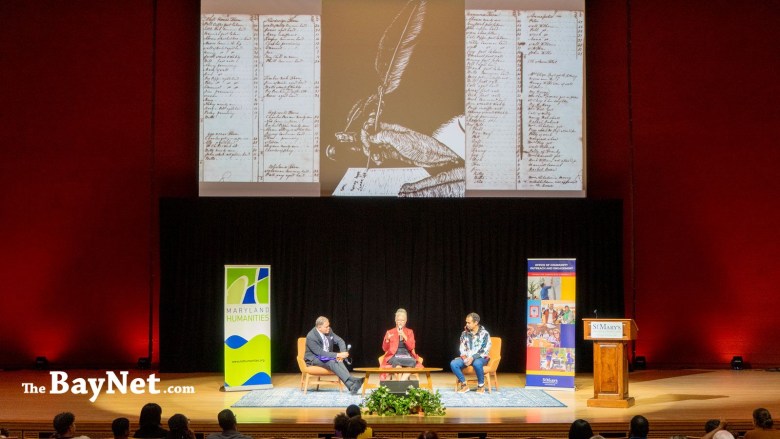 Image: Kin: Rooted in Hope Book Presentation
Image: Kin: Rooted in Hope Book Presentation
Got a tip or photo? Text us at 888-871-NEWS (6397) or email news@thebaynet.com.
Join The BayNet Membership for exclusive perks and zero ads.
Don’t miss a story—sign up for our newsletter!
Related

